Josep Borrell’s final days at the head of European security
Five years ago, when the Spaniard was appointed EU High Representative for Foreign Affairs and Security Policy, he said: ‘Europe must learn the language of power.’ He has tried to use this philosophy in Ukraine and the Middle East. On December 1 he left his position. His successor, Kaja Kallas, will seek to build a European defense system
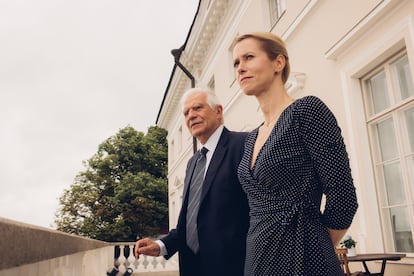
Latvia. July 2024. The big black car, surrounded by a tangle of escort vehicles, is speeding along the narrow road between the Adazi military base and Riga airport. For 48 hours we have been hot on the heels of the High Representative of the Union for Foreign Affairs and Security Policy (CFSP), Josep Borrell — the man entrusted in 2019 by the heads of state and government of the European Union with being the voice and fist of European diplomacy and security in the world — during a whirlwind trip to the Baltic republics. On this mini-tour he will also meet in Tallinn with Kaja Kallas, the former prime minister of Estonia (she left her position on July 23, 2024) and the person designated by the 27 to replace him from December. The Baltic states have a border with Russia more than 420 miles long, which they are rapidly reinforcing with hundreds of bunkers officially called “anti-mobility defensive installations.” It is the geographical limit of the European Union with Vladimir Putin’s empire.
In the Baltics, people have been living in a state of “existential anxiety” for more than 1,000 days since Russia invaded Ukraine on February 24, 2022. They fear becoming the next pawn to fall on Putin’s revisionist chessboard, being invaded, colonized, having puppet governments installed over them and losing the democracy they regained in the early 1990s when they broke away from the Soviet Union after 50 years of occupation and dictatorship. In 2004, they joined NATO and the EU. It was their life insurance. Their defense spending, as a percentage of their GDP, is one of the highest in Europe. The concern is detectable in every conversation in Tallinn or Riga. They feel the threat.
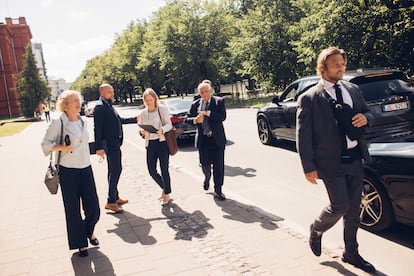
Traditionally Atlanticist, they now trust the EU more than ever. They know that the victory of the isolationist Donald Trump and the possible withdrawal of U.S. military aid for the defense of Ukraine (which during the Biden administration has amounted to more than $100 billion) could leave these European territories to their fate. The same would happen if NATO were to withdraw from the region (the United States pays for more than 70% of the Alliance’s expenses). And they are also aware that the U.S. president-elect can decree a humiliating peace for Ukraine in exchange for territories (20% of Ukraine) for Russia: “This would embolden Putin for future expansionist adventures, to begin with, in Moldova, which is not a member of NATO or the EU,” explains a veteran community diplomat, who continues: “For Putin, the bet is to defeat Ukraine [something he is slowly achieving] and to create a division between the members of the European Union [the attitude of Hungarian Prime Minister Viktor Orbán has been evident in this regard] as a previous step to rebuilding Russia’s leadership as the center of a supposed Eurasian civilization. Putin has lost half a million soldiers but he is moving forward.”
Faced with the risk of an escalation in the Baltic, an Estonian politician in Tallinn is clinging to Article 42.7 of the Treaty on European Union, which states: “If a Member State is the victim of armed aggression on its territory, the other Member States shall have towards it an obligation of aid and assistance by all the means in their power.”
General Miguel Ángel Ballesteros, former director of the Spanish Department of National Security, responds to this statement in Madrid: “Yes, Article 42.7 is very good, but it has to be approved by each EU member country, where there is no great speed in decision-making. And then, what do we attack with? We left Kabul in August 2021, when the United States hastily decided to leave Afghanistan, without being able to mount an operation to protect and evacuate people who had worked with us and had been trapped with the Taliban. We have serious shortcomings. The EU is going in the right direction in terms of security, but we could not defend ourselves without the umbrella of the Americans and NATO (which European leaders continue to consider the head of our collective defense). I can’t ever see a European army.” To which Félix Arteaga, an analyst at the Elcano Royal Institute, adds: “The important thing is not a European army, but a clear idea of where we are going.”
According to various sources, the 27 European armed forces (which a Spanish general defines as “bonsai armies”) suffer from complex systems for command and control of operations; intelligence, especially after the United Kingdom’s exit from the EU; radars and anti-aircraft defense (one of the keys at the moment, as seen in Israel in the face of the Iranian attacks); drones, in-flight refueling, ammunition and, worryingly, cyber defense. Their weapons depots had been exhausted since the economic crisis of 2008 and the subsequent vertiginous decline in investment in defense by the member states. In record time they have had to replenish these stocks and, in the same stroke, send hundreds of thousands of projectiles to Ukrainian President Volodymyr Zelenskiy so that Kyiv could resist Russia. Their commitment was to provide Ukraine with a million howitzers and rockets in a year. They have fallen halfway. The industry has not been able to do more.

Following the invasion of Ukraine, the 27 have had to step up their defense spending. According to the International Institute for Strategic Studies (IISS), between 2023 and 2024 it has increased from €200 to €300 billion ($210 to $315 billion). And spending this year has been 50% higher than in 2014, when Russia annexed Crimea and the wolf’s ears were exposed. Three days after the invasion of Ukraine, German Chancellor Olaf Scholz announced that he was going to create a special fund of €100 billion ($105 billion) (within his “decisive moment” strategic concept) for the defense of Germany, a country absent from global military affairs since World War II.
Twenty European countries already exceed the magic figure (set by the Obama administration in 2014) of 2% of their GDP for spending on military capabilities: Poland is above 4%, and the Baltic countries, 3%. Not so in Spain, which is around 1.3%, although, “since the invasion of Ukraine in 2022, the [Pedro] Sánchez government has increased investment by 67%,” explains Ricardo Martí Fluxá, president of Tedae, the lobby for the arms, security, and space companies sector in Spain, whose turnover in 2023 was €13.9 billion ($14.6 billion).

The European defense industry (a giant with sales, according to the European Parliament, of €120 billion ($126 billion), 465,000 employees, a limited number of large multinational companies, and more than 2,000 SMEs), which should be a pillar of European strategic autonomy, instead shows absolute fragmentation, small-scale entrepreneurship, and a lack of coordination to meet the growing demand of European partners. A weapons program can take 20 years to materialize. It is intended that 60% of purchases will be from European industry by 2035, and 40% from collaboration. Borrell explains: “In the United States there is only one army. They have only one model of tank, and in Europe, we have 12. And as for fighters and frigates, each European country has its own and they are not interoperable. And so on...” Today, the motto in the EU, under the dictates of Ursula von der Leyen, is to buy more, better, together, and European.
The reality is different. Around 80% of the weapons the European Union acquires are manufactured outside its borders; more than 70% are American. Only 18% of EU military capabilities programs are carried out jointly. Experts say that the technological race against China and the U.S. is being lost. “And these dependencies make us vulnerable,” explains Manuel de la Rocha, Director of Economic Affairs of the Presidency of the Government and Prime Minister Sánchez’s right-hand man at international summits. He continues: “With the pandemic we realized that we cannot depend on unreliable partners in critical aspects of our supply chain, such as energy, chips, lithium, copper, or even paracetamol, because it makes you more vulnerable. Your supply chain should not be the cheapest, but the safest. With this paradigm, Europe must take charge of its defense. Not depend on NATO. And that means developing dual-use industrial technology (military and civilian) that provides quality jobs. But we still lack size.”
To achieve this industrial scale, the Spanish government has relied on the century-old technology and defense company Indra as a “leading company” and “design authority” to create around it a core group of defense firms that provide subsystems to the systems and “make their own products, from design and engineering to manufacturing, certification, and maintenance. To compete and ensure that this technology remains in Spain. To own this system, export it, and improve it. And for its use to be dual, military and civil,” explains César Ramos, general manager of Tedae, the arms industry association. Looking at some of Indra’s systems at its factories on the outskirts of Madrid, such as the three-story-high Lanza radar, which can detect and track missiles and drones at a range of 500 kilometers (310 miles), or the Eurofighter flight simulator (capable of performing virtual maneuvers with partner countries in a combat cloud), one begins to understand the dual use of this technology born for war, but which also serves for peace, as was the case with the internet or GPS.
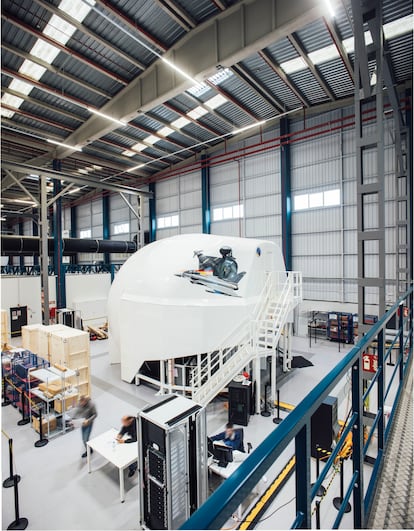
“But what is really lacking is political will,” exclaims Borrell. “Force without will is useless. Twenty-seven armies are not an army. And, furthermore, who would command it, to which political authority would it answer? Because the EU has no president. Defense policy is the responsibility of the member states; it is not community-based, but intergovernmental. And the countries must vote unanimously. The Commission has no say. Each state commands its Armed Forces and, jealously, its industry. And the members are not willing to give up that sovereignty [as they have done with the euro, trade, the ecological transition, or borders] because the armies are their last staging as nation states. No country gives in. And greater defense integration is needed. Operational and industrial. My job has been to coordinate and seek that shared position among the 27, and to advance in the construction of a common policy. And this has materialized in helping and defending Ukraine from day one. And, on the contrary, the heads of government have not agreed to demand a ceasefire in the Middle East or to sanction Israel for its actions in Gaza. Nor has there been unity in the Sahel, which we have left because each country has gone its own way. These have been failures. Threats loom over Europe. Conventional high-intensity warfare is here to stay. The EU must take care of its defense. Two years before the invasion of Ukraine, I already said that Europe must learn the language of power.”
Borrell, 77, an aeronautical engineer, economist, and professor, is a pure and romantic European and a thoroughbred politician. He is not an easy guy. He is an executive, fast, sharp, questions the data, has criteria, never keeps quiet and has, according to the Spanish ambassador Francisco José Fontán (who has been his shadow and chief of staff), “a moral compass like a house.” “He is an audible, brave and critical voice, sometimes amid terrifying silences, such as the humanitarian conflict in Palestine. He has stirred consciences and has not hidden,” he adds.
“He has been a politician among bureaucrats,” says the Italian diplomat Raffaella Iodice, head of the EU Crisis Response Centre. “He decided that we should return to Afghanistan in 2021; I was his representative in that country until the summer of 2024. Borrell was very brave, he believed that the EU had to be there to protect [the population] and pressure the Taliban regime for women’s rights. Not abandon them.”
On this last trip to the Baltics in July, the High Representative meets with heads of government, defense and foreign ministers, and military commanders; he visits NATO bases in Estonia and Latvia, with nearly 3,000 soldiers, makes forceful speeches and gives interviews. His pace is frenetic. Typical of a mountaineer from La Pobla de Segur (Catalonia). We carry out the last leg of his agenda together in his car to Riga airport, thanks to the services of his special adviser, Montserrat García Martínez. In the armored bubble of the limousine, Borrell allows himself a few moments of calm and whispers in a doctoral tone: “The EU is not a military union like NATO. It was born to avoid wars in Europe. Its weapon was trade. In the European Union, defense, as a public good, is the responsibility of the states, and they have not transferred it. However, in the same Treaties, these members have expressed their desire to build a common security [policy] that (with the verb in the conditional) could become a defensive union. But this would have to be approved unanimously by the European Council. The EU will go as far as the member states want it to go in terms of defense. In the meantime, steps are being taken, which have been made quicker by the conflicts in Ukraine and the Middle East. This is what I have been working on in these last five years.”
— For example?
— When I arrived in 2019, defense policy was embryonic, second-rate. Nobody read our reports and the military was poorly integrated. And today it works. We have a powerful diplomatic service, a guide to risks and threats [the Strategic Compass] and a structure for countries that want to go faster and further in their joint operations and their military and industrial integration [the Pesco]. We have an organisation [CARD] that reviews the defense situation of each country: what we have in excess and what we lack. And a European Defence Fund for the development of technologies, joint procurement, and production of ammunition. And we have worked on a Rapid Deployment Capability that will be made up of 5,000 troops and will allow us to react effectively to crises and protect citizens and the interests of the European Union in the world: it would have been ideal in 2021 to evacuate Afghanistan. And most importantly, we have created a fund of €18 billion ($19 billion), of which €11 billion ($11.6 billion) is for the defense of Ukraine, plus bilateral aid from member states, which amounts to another €38 billion ($40 billion). This is not counting the training and equipping we have carried out with 64,000 Ukrainian soldiers. This was unthinkable three years ago. We do not want war, we want peace. But we want a just peace, in which Russia pays for the destruction and acknowledges its moral guilt. We want a peace that protects the territorial integrity and sovereignty of Ukraine, not the peace of cemeteries.”
— What has been your biggest achievement as a high representative?
— Having achieved that the 27 provide arms to Ukraine in a coordinated way. And that has been to unite. And to take the lead. Putin has achieved the opposite of what he wanted, which was to divide us. And achieving this has not been easy: the Union had never bought arms [the Treaties say that its budget cannot be used to finance expenses derived from operations that have military implications], but we have been doing so for three years in a coordinated way with the contributions of each partner, although Orbán has not let us spend €6.5 billion ($6.8 billion) from the fund and is weakening the common position of the EU. When we do not act together, Europeans are weaker.
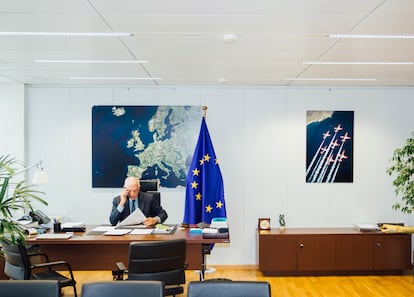
This last idea is emphasized by the new high representative, Kaja Kallas: “We can defeat all threats that come our way if we Europeans stick together: from cyber attacks to information manipulation and external hostility against our democratic processes. We have succeeded in moving away from Russian fossil fuels together to build our own energy security. That is the way forward.”
Tallinn. Kallas welcomes Borrell in the sober Stenbock Palace, the seat of the Estonian government. They meet for a couple of hours alone. On leaving, the gesture of both is serious. Kallas does not move a muscle. A 47-year-old lawyer and politician with a liberal ideology and experience in the European Parliament, she is a hawk in her unmitigated condemnation and her demand for criminal, economic, and political responsibility from Russia for the invasion of Ukraine. Putin ordered her arrest in 2022 for “hostile action toward historic memory and our country.” She responds: “The Russian imperialist dream has never died.” And she underlines: “The victory of Ukraine is a priority for all of us. The situation on the battlefield is very difficult and that is why we must continue working every day — today, tomorrow and as long as necessary — and with as much military, financial, and humanitarian aid as necessary. And this must be supported by a clear path for Ukraine to join the European Union.”
Estonia’s prime minister since 2021, Kallas was the obvious candidate to replace Borrell as high representative. This was rumored last spring in Brussels, a city overloaded with advisers, lobbyists, and spies. For a senior European diplomat: “She was the only candidate, without a rival. She has an image, charisma, she communicates well and she has been prime minister, so she knows the 27 as equals, and she has had access to all the information of the European Council. And she gets along well with Von der Leyen [who has an ideology interchangeable with hers], with whom she will have to deal, because Ursula is getting very involved in defense through her skills in industry. Kallas is anti-Putin and is brave. And she has the enemy at the gates. Her election is a direct message from the EU to Russia.”
“But, although she focuses on Ukraine, she cannot forget what is happening in the Middle East, Africa, Iran, Afghanistan, Venezuela, or Taiwan. These are also our interests,” adds Ambassador Iodice. “When she was appointed high representative, I sent her a globe turned upside down, so that she could see the world with a broader perspective.” Kallas’ roadmap is to be tough on Russia, to create an ethereal two-state solution in the Middle East, and to keep an eye on Iran, North Korea “and partly China.” And to develop European industry. “We cannot accept that Russia, Iran, and North Korea produce more equipment and ammunition than the entire Euro-Atlantic community. We need to invest more in defense and take on more responsibilities. We have the means to outdo them,” she stresses. And she concludes: “Without China’s support for Russia, Russia would not be able to continue its war with the same force. China also has to pay a higher price for that support.”
The Tapa base, Estonia’s largest military installation, is two hours from Tallinn. One of NATO’s multinational battlegroups is based here, with others in Eastern Europe, as well as in Bulgaria, Hungary, Latvia, Lithuania, Poland, Romania, and Slovakia (the latter under Spanish command). They are not large units, numbering between 1,000 and 2,000 NATO soldiers, but, as a diplomat who is an expert in security explains: “They are the bait. Their mission is to hold off the first wave. If one day Putin decides to attack and touches even one of these soldiers, we will give him everything.”
The Tapa base is working non-stop. Just like the Adazi base in Latvia. It is growing by the day. There is space and facilities for 5,000 people. On its four square miles there are weapons depots, helipads, rocket launchers, tanks, sapper vehicles, and a complete logistics system with thousands of tires and spare parts. In an isolated room, a meeting of Estonian intelligence is taking place. The young colonel in charge of operations for the Estonian army explains to Borrell, in front of a large map, the concept of fait accompli that Russia has followed for the last two decades in its military operations in Chechnya, Georgia, Crimea, Syria, and Ukraine. “We always thought that he was not going to attack… and he attacked. We have suffered in Europe from this human tendency to deny the evidence of facts that we do not like. But Putin attacked. And he will do it again. We cannot stand still. Russia relies on surprise and rapid deployment. He has the initiative. If they hit us, they will do so with twice the force they hit Ukraine. The Baltics are their best scenario for the collapse of the entire Western system; Russia has more experience and the West can be surprised again. Our solution is to win the first battle on the border. Keep them at bay. Be defensive and also offensive. From now on, every moment is crucial.” A politician whispers to me: “It is not psychological fear, it is reality.” Borrell reflects at the end of the meeting: “It is our job to be the deterrent to a Putin invasion in Eastern Europe. If he attacks them, let them know that they are not alone.”
Brussels. October 2024. Borrell is packing up his office as high representative on the sixth floor of the European External Action Service building, at 9A Rond Point Schuman. Boxes are coming out. It is a huge glass space, almost like a New York loft, from which you can see the European Commission building and, to its left, the Council building. The two EU institutions, one community-based, the other intergovernmental, between which he has had to mediate in diplomacy and security over these five years. On one side, the powerful Von der Leyen; on the other, the 27. Between the two, a minefield. This is the landscape that Kaja Kallas is going to inherit.
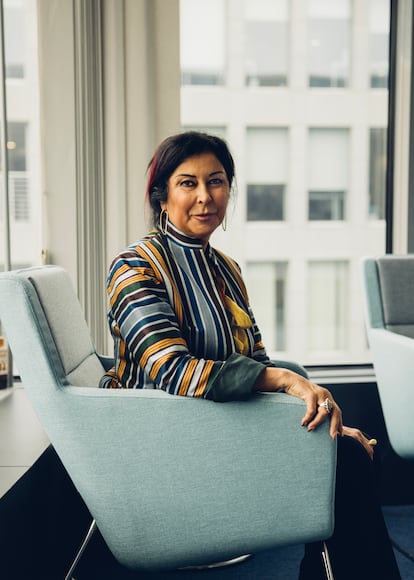
Borrell goes back to the first days of 2022. “On January 4, a full month before the invasion, I went to Ukraine for two days. I wanted to see what was happening. Russian troops were already stationed on the border and insurgency operations were underway to weaken Ukraine. We visited the Donbas front, which was badly damaged by the war. On the way back to Kyiv, Prime Minister [Denis] Shmyhal said to me, looking me in the eye: ‘Putin is going to attack us. Even if you don’t think so, we know he is going to attack. Are you going to help us? Are you going to give us the weapons we need to defend ourselves? Even if you don’t come to fight, give us the weapons!’ I will never forget it. He was talking about his survival. Looking him in the eye, I answered yes… but I couldn’t give him a definitive answer either. I didn’t know if the EU was going to do it. I had never before provided military aid to a country at war.”
Back in Brussels on January 6, Borrell called the political director of his foreign service, the veteran Spanish diplomat Enrique Mora, a specialist in Iran and nuclear negotiations, with a complex agenda of contacts around the world, who recalls: “The high representative told me in a few words: ‘The Russians have something on their minds. Go to Moscow and keep me informed.’ I flew the next day and spoke to three good sources, important people in the administration. And they confided to me that Putin did not have a plan B and that he was going to invade. I went back and showed Borrell the scenario. On February 24, Putin entered Ukraine.”
“In the first days of the war, Ukraine was able to hold out thanks to the old Soviet-era weapons depots still in stock with its Eastern European partners, which were familiar to the Ukrainians and interoperable with their systems, and which they transferred in a very short time,” says Borrell. “They were vital to hold out when the Russian tanks arrived at the gates of Kyiv. I had been thinking for some time about how to supply weapons to Ukraine. And it occurred to me that we had the European Peace Facility, which was used to finance our missions abroad and had the possibility of reinforcing the non-EU armies we were assisting. It had been used to equip African armed forces with uniforms, helmets, boots. At this moment, it was the perfect instrument to help them. I forged the agreement. On February 28, the EU authorized an initial disbursement of €500 million [$525 million] to support Ukraine (when some optimists considered it would be a success if we achieved €50 million). Today, there are more than €11 billion. But if we stop these shipments and the United States withdraws, the Ukrainians won’t have ammunition to hold out for two weeks.” President Joe Biden’s latest “lame duck” support for Ukraine has been to lift the ban on the use of American long-range missiles against Russia. A decision in overtime that Donald Trump could in turn cancel when he becomes commander-in-chief, starting on January 20, 2025.
The EU is not a military power, but it is an economic and cooperation power that bases its action, according to the Treaties, on “the principles of liberty, democracy, respect for human rights and fundamental freedoms, and the rule of law.” Few strategic actors treasure such high ideals. Europe does not have a federal army, but it is an expert in crisis management, emergency response, interposition, cooperation, humanitarian aid, and reconstruction. The EU’s Team Europe is the world’s leading donor of development aid. Since October 2023, this instrument has sent €1 billion to Palestine. And the European Union has kept Ukraine financially afloat with credit lines and subsidies worth €57.8 billion ($60.7 billion). The sociologist and socialist politician Pau Marí, who chaired the Spanish Congress’s Foreign Affairs Committee between 2020 and 2023, explains: “We have not sent them precision weapons like the Americans, but we have spent a lot to keep Ukraine afloat. We have paid the salaries of its administration and its soldiers; we have financed the ordinary functioning of the state; we have sent generators so that the country did not come to a standstill after Putin bombed its power stations. In Kyiv, everything works, there is war, but it is not a failed state. It has not collapsed. And the EU has a lot to do with it.”

“Just five years ago, in 2019, European defense was pure wishful thinking and now, as we come to the end of 2024, it is no longer a matter of smoke and mirrors and meaningless debates,” explains diplomat María Lledó, former Secretary General for the EU at the Spanish Ministry of Foreign Affairs. “There has been progress. There are clear threats. The do-goodism is over. Even the frugal countries are betting on giving money to the military industry. But it will stop there, in terms of industry, I do not envisage a real transfer of sovereignty by the 27 in terms of defense.”
Little by little, however, over the past 25 years the European Union has been developing a complex toolbox in foreign policy and security that was started by the first high representative, Javier Solana, in 1999. An omelette that has taken shape during Borrell’s turbulent five-year term. In five years, it has given muscle to European security and defense instruments. Next to his office is a discreet, armored door with a code, which leads into the bowels of the European External Action Service. There is the Crisis Response Centre, covered with screens with Russian and Arabic news, and maps that evolve in real time and indicate and classify threats. It is the secure communications instrument that connects Brussels with the 144 EU embassies, and provides security for its officials and European citizens in conflict-affected territories, from Sudan and Yemen to Lebanon, Ukraine and Niger.
It also receives daily images captured from space and their subsequent analysis from the EU Satellite Centre, at the Madrid base of Torrejón, directed by the French Rear Admiral Louis Tillier. The Response Centre has 77 analysts, diplomats, military personnel, and police. A Spanish colonel stationed there explains: “Here we work 24 hours a day. We receive information from every possible means from each country: our team processes it, checks whether it is disinformation or fake news, and makes classified reports. And it also provides a global, comprehensive and timely early warning, alerting all the actors involved.”
In Brussels, at 88 Arlon Street, in a gray and nondescript building, there are two other instruments of EU foreign and security policy: the Intelligence Centre and the Military Staff. The first is headed by Croatian commander Daniel Markic, who was in charge of his country’s secret services. The INTCEN has around 100 analysts from the intelligence services of the 27 member states. Its agents do not acquire information through clandestine actions, but they feed on the information provided to them by their partners (when they provide it). The second is commanded by Dutch Lieutenant General Michiel van der Laan, who has 200 officers on his staff and 115 for military planning. His staff could be the embryo of the future headquarters of the European army.
As Solana, 82, explains: “It won’t be easy, but one day there could be a European army, as happened with the euro. It is essential that a coalition of countries be formed among the 27 member states that want to go further in defense together, as happened with the European currency. And that no EU country vetoes it, as no partner did with the euro, they simply did not give up that sovereignty. And today it is the currency of 350 million people. There can be two speeds.”
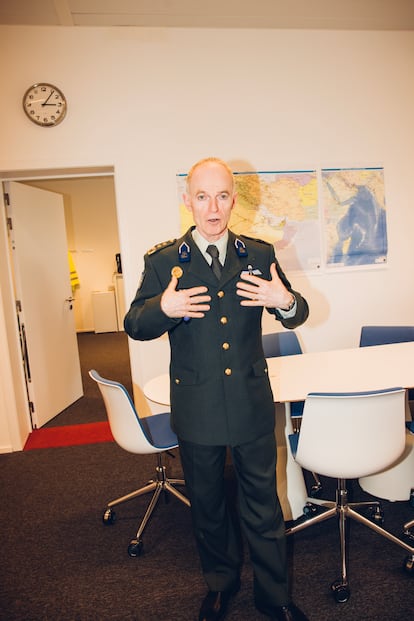
The end of this story has a moral tone. The EU’s secret weapon in favor of Ukraine is not a missile, but the €260 billion in Russian assets (in securities and cash) frozen in the EU, the G7 countries, and Australia since the beginning of the invasion, of which 70% is held in the Union. As one diplomat explains: “Putin thought that the invasion was a matter of two days and did not withdraw them from our banks. The EU has already given Ukraine €1.5 billion [$1.58 billion] in interest generated by that capital. And it has not been ruled out that those €260 billion[$273 billion] will one day be used to rebuild Ukraine, especially if the U.S. withdraws. It is legally complex, but possible.”
This weapon responds to a phrase from Borrell that has made history — ”and that Macron has copied from me,” he adds: “Europe cannot be the only herbivore in a world of carnivores.”
Sign up for our weekly newsletter to get more English-language news coverage from EL PAÍS USA Edition
Tu suscripción se está usando en otro dispositivo
¿Quieres añadir otro usuario a tu suscripción?
Si continúas leyendo en este dispositivo, no se podrá leer en el otro.
FlechaTu suscripción se está usando en otro dispositivo y solo puedes acceder a EL PAÍS desde un dispositivo a la vez.
Si quieres compartir tu cuenta, cambia tu suscripción a la modalidad Premium, así podrás añadir otro usuario. Cada uno accederá con su propia cuenta de email, lo que os permitirá personalizar vuestra experiencia en EL PAÍS.
¿Tienes una suscripción de empresa? Accede aquí para contratar más cuentas.
En el caso de no saber quién está usando tu cuenta, te recomendamos cambiar tu contraseña aquí.
Si decides continuar compartiendo tu cuenta, este mensaje se mostrará en tu dispositivo y en el de la otra persona que está usando tu cuenta de forma indefinida, afectando a tu experiencia de lectura. Puedes consultar aquí los términos y condiciones de la suscripción digital.









































